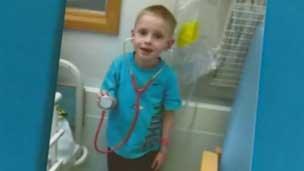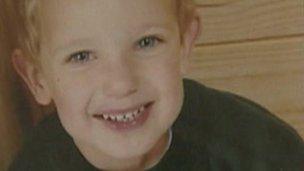Bristol Children's Hospital heart operations reduced
- Published

Luke Jenkins had heart surgery at Bristol Children's Hospital and later suffered cardiac arrest and died
Bristol Children's Hospital is to reduce the number of heart operations carried out after a formal warning over staffing levels on its cardiac unit.
A Care Quality Commission (CQC) report found the trust failed to meet safety standards for staffing levels, training and support and patient welfare.
The report follows a series of concerns over the care of children at the unit.
Two cardiac high dependency beds have been created and the number of beds at the unit has been cut from 16 to 12.
University Hospitals Bristol NHS Foundation Trust (UBHT) said it had "improved the nurse to patient numbers".
'Increasing demand'
An unannounced inspection was carried out on 5 September following concerns raised by two families whose children had been patients at the children's hospital.
Luke Jenkins, seven, of Cardiff, had been expected to make a recovery after heart surgery at the hospital.
He was moved from intensive care 24 hours after the operation because of "increasing demand" on beds in the department but later suffered cardiac arrest and died.
"They're looking after seriously ill patients - as they keep saying - and they've not got enough staff to look after them so they're putting children's lives at risk," said Stephen Jenkins, Luke's father.
A report put together by an investigative team at University Hospitals Bristol NHS Foundation Trust said "the workload and patient dependency is recognised as being significant" in Luke's death.

Sean Turner, four, was only readmitted to intensive care after suffering a cardiac arrest
Three weeks earlier Sean Turner, four, had died on the same ward.
He was transferred from intensive care to the ward one day after surgery.
His parents asked for him to go back into intensive care but he was not allowed to return until he suffered a cardiac arrest in his father's arms four days after surgery.
Sean died four weeks later from a significant bleed in his brain.
A hospital review into his death found staff shortages, failure of staff to recognise his deteriorating condition and poor communication with his parents had contributed.
"If you haven't got the staff to make the children better don't take them. Why rush them through?" said Stephen Turner, Sean father.
"It [the unit] needs to be closed down," said Yolanda Turner, Sean's mother.
"We've been saying it ever since Sean and Luke. When Luke died after Sean that shouldn't have happened. It's unsafe in there and we witnessed that twice.
"They're not prepared for the children who have complications after surgery. They can't cope with that."
Not sustainable
Ian Biggs, deputy director of the CQC in the South, said: "We found that on a number of shifts, staffing levels on Ward 32 fell below these inadequate levels and to make matters worse, some staff did not have the appropriate experience to care for patients with high dependency needs.
"Doctors and nurses told us that the current staffing levels were having an impact on the care and service being provided, with checks missed or reduced at times and not enough time to communicate with families.
"The trust themselves have acknowledged that their system of providing high dependency care was not sustainable.
"But having identified the risks of providing high dependency care on a general ward, they had not taken effective steps to ensure they reduced the risks to patients. "
The trust has been told it must provide a report within seven days setting out how it will meet the other standards.
Robert Woolley, Chief Executive of UBHT, said: "I am deeply concerned that some families believe that we have let them down and will continue to ensure that we address their concerns and bring forward our plans to develop a high dependency unit.
"We have also improved the nurse to patient numbers on the cardiac ward. As a result of these actions, I believe we have addressed the issues leading to the warning notice and I would welcome a return visit from the CQC to confirm this."
CQC inspectors will monitor the trust's progress and check to ensure the improvements it requires have been made.
- Published12 September 2012
- Published10 September 2012
- Published10 September 2012